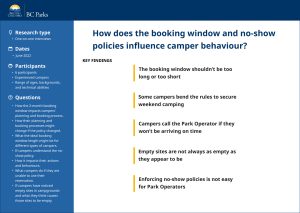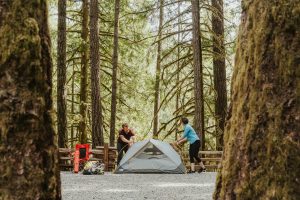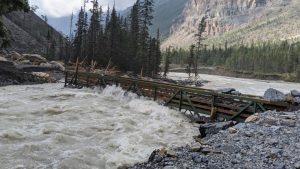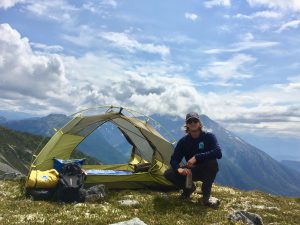How do the booking window and no-show policies influence camper behaviour?
Categories:
In the past year, BC Parks established a program of ongoing design research that provides direct access to feedback from the people who use our services. This blog shares the newest part of that program, and what we’ve learned so far.
So far, our research has covered four public service areas:
- BC Parks website
- Camping reservations
- Day use passes
- Camping reservation policies
In this post, we share research findings about camping reservation policies.
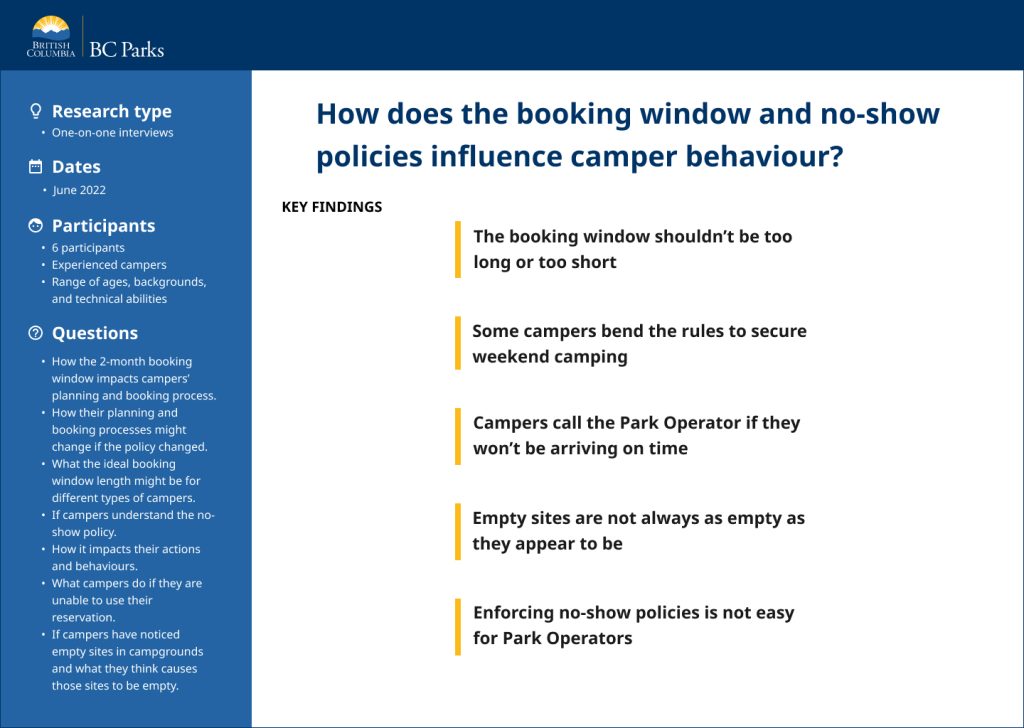
In June 2022, we conducted one-on-one research interviews with people who have signed up to take part in user research with BC Parks. We also held a workshop with 16 Park Operators (the people who are responsible for what happens in the campgrounds) to explore the impact of no-shows on park operations.
Our goals were to:
- Understand how the policies affect campers’ behaviour and attitudes in relation to their personal needs and lifestyles.
- Explore how changes to the policies might change campers’ behaviours and attitudes.
In this first round of policy research, we explored two key policies:
- Booking window – the length of time before the arrival date that campgrounds open for booking. Currently BC Parks has a 2-month booking window.
- No-show policy – these are the rules that relate to what happens if a camper doesn’t show up for their reservation.
Interested in design research at BC Parks? Don’t miss these posts:
- To learn how design research works and what research we’ve done during the past year, read A Year of Design Research at BC Parks.
- To see our findings about how people use the BC Parks website, read What do BC Parks visitors want from our website
- To find out what people think about the camping reservation website, read How can we make it easier to reserve camping
What were our key findings about the booking window policy ?
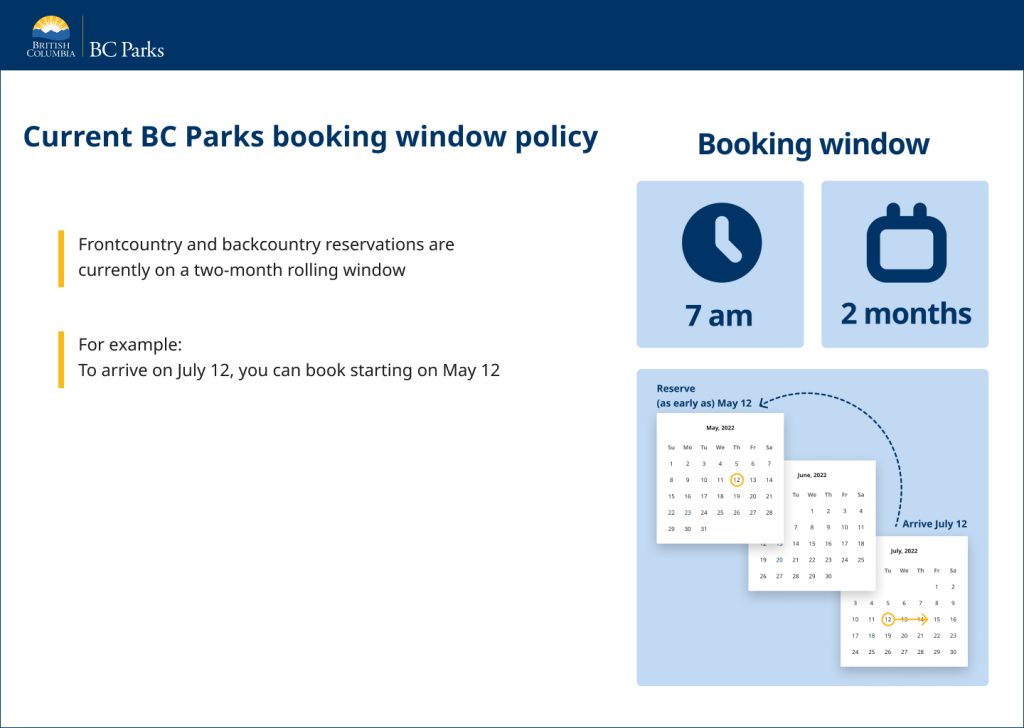
What questions were we trying to answer?
We wanted to know:
- How the 2-month booking window impacts campers’ planning and booking processes.
- How their planning and booking process might change if the policy was changed.
- What the ideal booking window length might be for different types of campers.
The booking window shouldn’t be too long or too short
“With a 2-month booking window it’s hard to make alternative plans if I don’t get a site.” – Research participant
“Before, when it was 4 months, I really did appreciate that, especially for someone who camps on a regular basis. I think being able to book earlier means it’s less fighting for availability with other people.” – Research participant
What if the window was 2-week? “*gasp* Can you see from my face how I feel? That would give me panic attacks.” – Research participant
Key findings:
- Generally, people felt that:
- Anything shorter than a 2-month window would be make planning very difficult and stressful.
- Most people felt a 4-month rolling window is a good length. Many said that it would give them time to make other summer plans if they cannot get a reservation.
- Most people did not like the idea of a reservation window longer than 4 months, saying it would likely cause sites to be snapped up too quickly and produce more frustration.
- People did not like the idea of a lottery system for the entire season. They felt it would be stressful and potentially result in some campers never being able to get reservations.
- People felt that giving different campgrounds different booking window would make it difficult to keep track and stay organized while planning their camping trips.
Some campers bend the rules to secure weekend camping
“You’re more likely to get a weekend booking if you book the Wednesday or Thursday.” – Research participant
“We do often pay for an extra night so that we can book on the Thursday so we’re not fighting on the Friday.” – Research participant
“In my heart I hate booking days I don’t need, and I feel bad about the way we do it, but it’s the only way to get a weekend sometimes.” – Research participant
Key findings:
- Some campers said that because it’s so hard to get a weekend booking, they book extra nights before the weekend even if they have no intention of camping on those nights.
- At the same time, all participants expressed frustration when they see empty campsites in a fully reserved campground.
What were our key findings about the no-show policy?
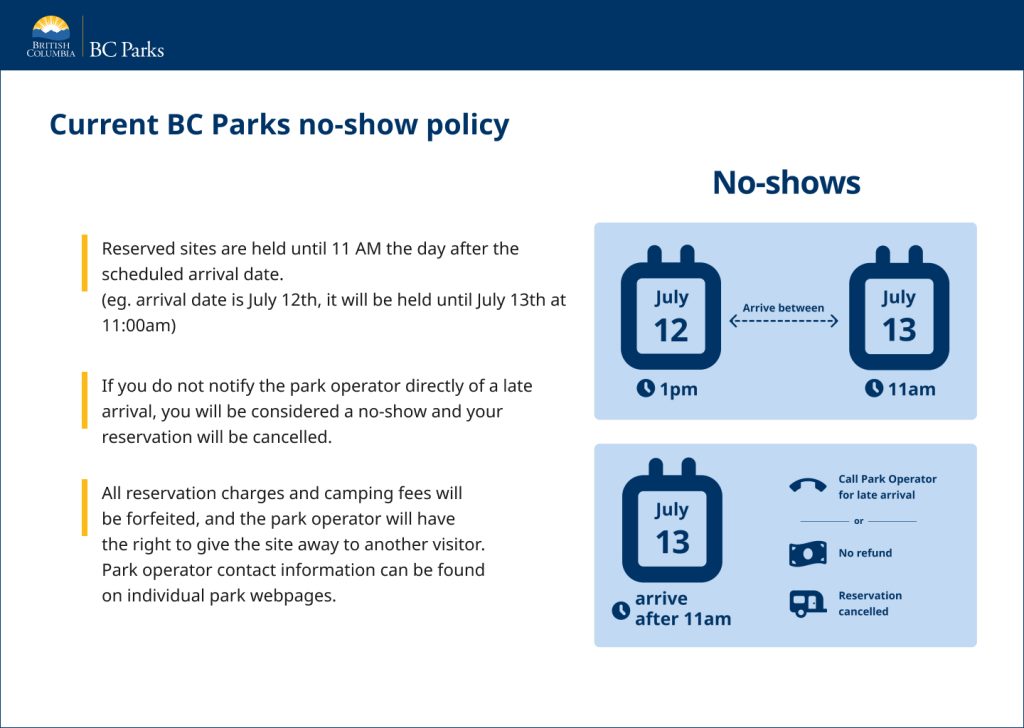
What questions were we trying to answer?
We wanted to know:
- If campers understand the no-show policy.
- How it impacts their actions and behaviours.
- What campers do if they are unable to use their reservation.
- If campers have noticed empty sites in campgrounds and what they think causes those sites to be empty.
We also held a workshop with 16 Park Operators to get a better understanding of:
- What Park Operators think causes empty sites in the campground.
- What challenges do Park Operators experience when enforcing the no-show policy?
- How they enforce the policy.
- What the consequences are of enforcing, or not enforcing, the policy.
Campers call the Park Operator if they won’t be arriving on time
“If I couldn’t make the first day of a trip, I would call the park to let them know.” – Research participant
“If I cancelled the first day of my trip, I would phone to let the park operator know, but I would expect to still be paying the original amount.” – Research participant
“I often send out a group text to my friends if we can’t make it and see if one of them can use the days. If not, I will call the park and let them know.” – Research participant
Key findings:
- Most people said they would call the park to let them know if they can’t show up on the first day of their reservations. If they didn’t call, they would worry about that their site would be given away.
- One participant said that, if they couldn’t use any of their reservation, they would check with friends or family to see who could use the site. This way, they said, their friends would pay them for the site, which is better than losing their site fees by not showing up.
- Some campers book more nights than they plan on using and then call the Park Operator to let them know that they’ll arrive a day (or more) late.
Empty sites are not always as empty as they appear to be
“Everything is booking online but there are so many empty campsites in the park!” – Research Participant
“It’s frustrating when we arrive and see reserved sites, but the people don’t show and it’s still tagged as reserved. Then no one else can use it. I don’t understand that, and I’ve seen it in more than one park.” – Research Participant
“Campers have from 1pm until all night to check in and people walking through the park don’t realize that. They just see empty sites on their walk.” – Park Operator
Key findings:
- Campers often see empty campsites in parks that show up as full on the reservation site.
- Many assume that these sites are due to campers not showing up for their reservations.
- Some said that this is because Park Operators do not enforce the no-show policy and make these campsites available to other campers.
- Park Operators said that there are many reasons for empty sites, including:
- People have not checked in yet or have requested a late check in.
- People arrive with a motor home as their only form of transportation, so when they are out exploring the day, the site appears to be empty.
- People leave early and don’t inform the Park Operator.
- There are huge numbers of check outs on Sundays and holiday Mondays. Up to 3/4 of the campgrounds can be empty from 11am to mid-late afternoon before the next round of campers checks in, giving the illusion of emptiness.
- Many people game the system by booking up to several days before they plan on arriving. Park Operators have difficulty enforcing the no-show policy for some of the reasons shown below.
Enforcing no-show policies is not easy for Park Operators
“In my experience I don’t think the rules are being enforced. The park operators are too kind.” – Research Participant
“If the policy is adhered to regularly in all parks, people would be more courteous and less dismissive of the process.” – Research Participant
“If I give away one of my sites that are super popular and the no-show shows up, it will be a major incident – as in probably several hours of talking to the person plus an incident report.” – Park Operator
Key findings:
Some campers felt policies were not being enforced in the campgrounds they visit. Specifically, policies related to:
- Over-population of sites — too many vehicles or campers on a site
- Generators being used outside of allowed hours
- No-shows
Park Operators said they are in a tough position when it comes to enforcing the no-show policy.
- They must balance upholding the policies with being understanding to those who have a good reason for not arriving on time.
Upset campers can be aggressive towards Park Operators or even other campers if they arrive late to find their campsite has been given away.
Most Park Operators do their best to try and contact the person who has reserved a campsite, before giving away the campsite to another party.
Many campgrounds do not have internet or phone connectivity, so Park Operators can’t receive notifications of late arrivals until it’s too late. This makes it even more difficult to make the decision to give away a reserved campsite.
What’s next?
- Review of current policies will continue; further research is needed to explore these and other policies to gain an understand of how and where simplifications and improvements can be made.
- Based off key findings, recommendations will be drafted for implementation for the 2023/24 camping season
- Continued policy improvement work – further research, additional user feedback sessions as well as Park Operator engagements
- Continue to improve the reservation system based on feedback and to make sure the system supports our policies.
- Before the 2023/24 camping season, educational campaign explaining BC Parks policies and their impact and importance on reservation availability.
How can you take part in our research?
Start by participating in one of our live surveys
Camping reservations survey
Have you made a camping reservation for the 2022 season? If so, we’re eager to hear what you think of the new site. Take the survey.
BC Parks beta website survey
- Visit the beta site first.
A “beta” is a service – in this case a content service / website – that has been released to the public in limited form, to gather feedback before the site launches fully. We’re working towards replacing the “legacy” version of bcparks.ca in its entirety, later this year. - Click the Feedback Form link at the top of the site (in the bright yellow strip) to share your thoughts.
Volunteer for one-on-one research sessions
We are always looking for people who would like to take part in our design research activities. If you’re interested in one-on-one research, you can sign up using this form.
We contact people from our (very long! we’re chuffed, thank you!) volunteer list at random, so we can’t promise that we’ll be able to talk to you for this type of research.

